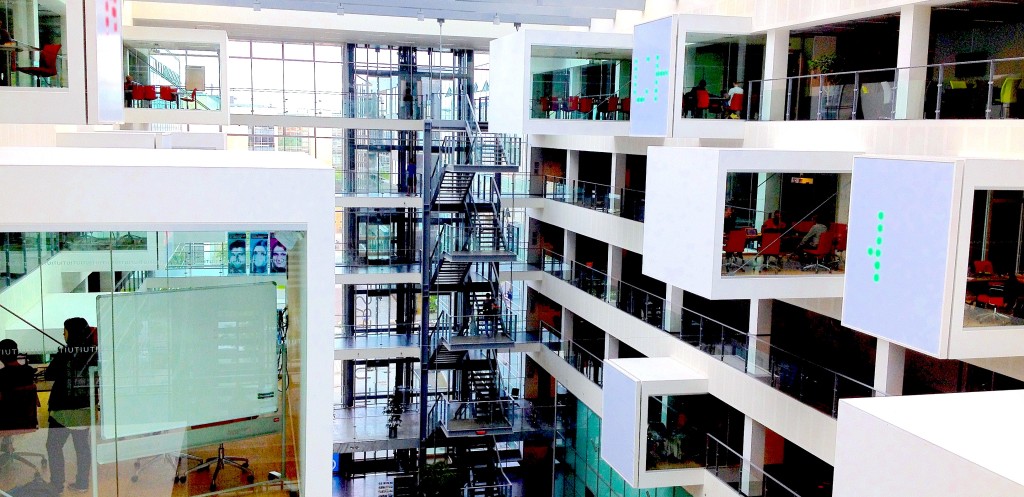I’ve spent the last two days at a Socialising Big Data workshop at the futuristic IT University Copenhagen. Big Data is one of those trendy all encompassing buzz-words that  refers to the proliferation of data gathered everyday on all of us, from our food purchasing, health services access, sleep and exercise patterns to Grindr hookups. This information can be used for anything from predictive epidemic preparation (like google flue trends) to just-in-time manufacturing.
 IT University of Copenhagen Campus
IT University of Copenhagen Campus
Every time you use Maps, Run Keeper, or Twitter, catch the bus, go to the doctor, use public rubbish bins, listen to music, read your email or use your credit card, your information is being saved and analysed. Facebook even has plans to listen to our conversations through our own phones’ microphone every time we use their App. There is some lip service paid to ethics and security, but with technological developments fast outstripping developments in law, on top of the recent revelations of the NSA and Yahoo breaches, no-one can ever know who has access to our ‘private’ information. The only way to avoid the hungry eyes of Big Brother would be not to partake in these modern conveniences. But even so your information can still turn up in the public domain.
When I moved to Sweden I was mildly disconcerted to find my personal details online. Yes I am 30, single, and live above a kebab shop. No rose tinted glasses on Google. Also that is my actual salary.
I could email The Authorities and ask them to take this information down, but for some reason I haven’t.
There is some part of me that believes in radical transparency. If government and financial institutions keep tabs on me, why not everyone else? In the words of American policy intellectual Samuel P. Huntington “Power remains strong when it remains in the dark; exposed to the sunlight it begins to evaporate.â€(in Chomsky, 2014). If everyone knows everything then there are no secrets to hide. When there are no secrets, asymmetry of power can be balanced.
Salary negotiations are a great example of this, in Sweden the difference between men and women’s economic participation is 94% compared to the 60% world average (World Economic Forum, Global Gender Gap Report, 2013).
If everyone’s data is included in research, can this lead to more representative depictions of reality, and can avoid special interest groups perpetuating power inequalities? Or does big data lead to further exploitation of the powerless?

I enjoyed your blogpost on our experiences at the workshop! Just thought I’d add that actually I can’t see your salary (it says I have to be a member? Does that mean member of Swedish Society:-) ?) Super interesting though, that that has lead to a more equal wage between men and women. I must say this softens my initial resistance towards this particular phenomenon…
Great analysis. If you want to read an interesting fictional account of where total transparency may lead, check out The Circle by Dave Eggers – he tells a story of a time in the not too distant future when technology begins to rule our lives.